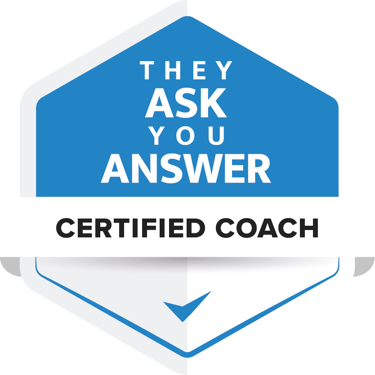What are the pros and cons of group coaching?

As of September 2024, you can also join Buzzlytics for TAYA Group Mastery.
This is a group version of our successful 1-on-1 TAYA Mastery track. with which we also want to give smaller SMEs with a limited budget the opportunity to They Ask, You Answer to implement.
Now I can imagine that this new offering raises all sorts of questions for you:
- Isn't such a group track just a watered-down version of a 1-on-1 track?
- Will I get as much value?
- What are the disadvantages of a group course that I should be aware of?
I myself have participated in an intensive group coaching program for the past six months to become a certified They Ask, You Answer coach. So I have experienced first-hand the advantages and disadvantages of group coaching and in this article I share them with you.
By the end of this article, you can make an informed decision as to whether the benefits of group coaching outweigh the drawbacks for you and thus whether TAYA Group Mastery is right for your business.
Disadvantages of group coaching
We pull the band-aid off and immediately begin the cons.
Disadvantage 1: There is less individual attention.
The first disadvantage is that the coach has to divide his attention among several people. Consequently, there is less time to go deep into your own cases, which can be frustrating if you have specific questions or the need to go deeper into a particular topic.
In a group coaching program, there is less time to go deep into your own questions.
Disadvantage 2: Not everything is equally relevant to everyone
A second disadvantage is that not everything discussed is equally relevant to everyone. In my own coaching program, for example, it was also about sales. This is less interesting if you don't do sales yourself.
In TAYA Group Mastery, salespeople and content managers attend separate sessions, so this problem will not arise, but there may be times when, for example, a content manager wants to bring in a case that may be less relevant to another content manager.
Disadvantage 3: There may be level differences
This brings us to the next drawback: potential level differences. For example, both novice and experienced content managers can participate in TAYA Group Mastery.
For beginners, it is nice to be able to draw on their more experienced peers. But it can also cause them to feel overwhelmed and intimidated, as they suddenly realize how much they still have to learn.
On the other hand, it can be nice for experienced content managers to share tips and tricks with beginners. It's easy for them to forget how much knowledge and experience they already have ("the curse of knowledge"), and it's good for their self-confidence to regain a sense of that. However, it can also be frustrating to always be the one giving, rather than having giving and receiving balanced.
But for both novice and experienced content managers, they will learn many new things in TAYA Group Mastery:
- They will write about topics they have not written about before.
- They will have to build their articles in a very different way than they are used to.
- They will have to get used to writing their content not just for search engines anymore, but for sales.
In our article Can every senior content manager become a TAYA content manager? We take a closer look at what makes TAYA content different and what skills a TAYA content manager needs.
Both novice and experienced content managers will learn many new things in TAYA Group Mastery.
Disadvantage 4: It can be exciting to be vulnerable
A final disadvantage is that it can be more difficult to be vulnerable in a group than in a one-on-one situation. You will have to share personal experiences or problems you are running into, and that can be exciting at first when other people are listening in.
I myself found this quite exciting at the beginning of my coaching process.
Still, it's important to get over that threshold, because that's how you get the most out of group coaching. An additional advantage of making yourself vulnerable: if you do it, chances are that others will follow.
Benefits of group coaching
In addition to the disadvantages mentioned, group coaching also has advantages that I discuss in more detail below.
Benefit 1: It is more cost-effective
The first advantage is that group coaching is often cheaper than 1-on-1 coaching. This also applies to TAYA Group Mastery.
The investment for Group Mastery is currently (July 2024) 19,750 ex. VAT for 6 months, while for 6 months TAYA Mastery you will spend 25,500 to 32,000.
Group coaching is thus a cost-effective solution for smaller SMEs who are reluctant to invest in 1-on-1 coaching but are still eager to implement They Ask, You Answer.
Also read: TAYA Mastery vs. Group Mastery: which is the best option for your business?
TAYA Group Mastery is a cost-effective solution for smaller SMEs looking to implement They Ask, You Answer.
Benefit 2: You learn from each other
A second benefit, which I personally found to be one of the greatest benefits of my coaching program, is that you can learn from each other's experiences and insights.
My group included people from all over the world, each with their own background and expertise. This provided a rich learning environment where we learned not only from the coach, but also from each other.
A concrete example of this are the role plays we did. We had to practice dealing with resistance and because we did this in a group, we were able to learn from each other's mistakes and successes. The first person who did the role-play received feedback from the coach and the next participant could immediately build on this. This allowed us to improve ourselves quickly.
Furthermore, in a group you are dealing with people who are in the same boat as you. Many companies run into similar challenges. By discussing these in a group, you not only get the coach's insights but also valuable input from the other participants.
Finally, you learn from the feedback others receive. Even though the situation may not be 1-to-1 the same as yours, you can apply the feedback to your own situation - now or in the future, if you find yourself in a similar situation.
In group coaching, you get not only the coach's insights, but also valuable input from the other participants.
Benefit 3: It can be less intimidating than 1-on-1
One final benefit of group coaching that I want to mention is that a group setting can also be less intimidating for some of your employees than a 1-on-1 meeting with an experienced coach. It can be comforting for them to see that others are struggling with the same challenges.
Sharing successes and challenges with people who are in the same boat can also create a sense of belonging. And that, in turn, creates a positive group dynamic, where participants encourage and motivate each other.
TAYA Group Mastery is a full-fledged alternative to TAYA Mastery
Group coaching has both advantages and disadvantages. Group Mastery is not a watered-down version of TAYA Mastery, but may actually be the better choice if you enjoy learning in a group and are looking next to a cost-effective way to implement They Ask, You Answer with guidance.
At Buzzlytics, we help companies successfully implement They Ask, You Answer on a daily basis. Until now, we've been doing that with TAYA Mastery, but starting in September, we'll also be doing it with TAYA Group Mastery.
After reading this article, do you still doubt whether TAYA Group Mastery is the best choice for your company? Please read our article TAYA Mastery vs. TAYA Group Mastery: what is the best option for your company, or schedule a meeting with one of our consultants. They will be happy to think with you about what is the best option for you.
Related articles
July 2, 2024
-
Reading time: +/- 4 min
June 6, 2024
-
Reading time: +/- 10 min
June 18, 2024
-
Reading time: +/- 9 min








